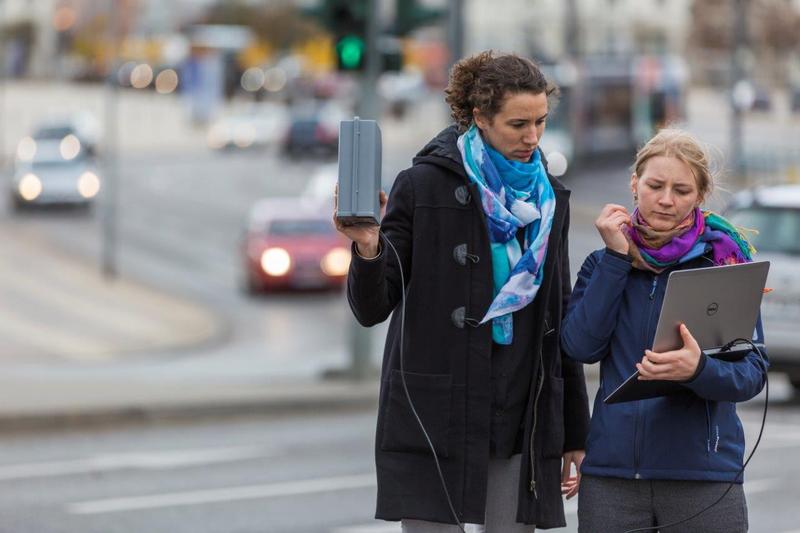
Reducing Black Carbon: Protecting Health and Climate Together

IASS researchers measuring concentrations of particulate matter in the air.
Image: © IASS/Rolf Schulten
Particulate matter puts human health in danger: Everybody who inhales it is at risk of developing cardiovascular and respiratory problems. Soot, which is mainly made up of black carbon, is emitted from diesel motors, industrial chimneys, and heating stoves, thereby adding to air pollution.
The fine carbon particles in the air threaten not only human health but also the climate, since black carbon contributes to global warming. When soot particles settle on snow and ice, the Earth’s capacity for reflecting sunlight back into space is reduced. As a result, ice melts more quickly and the temperature rises.
Conversely, by tackling black carbon, we can kill two birds with one stone and protect both health and the climate. This is why the negative effects of black carbon are increasingly in the spotlight. How can policymakers and researchers make progress towards reducing it?
At the preparatory meeting for the UN Climate Conference in Bonn, IASS Director and climate scientist Mark Lawrence will give a short talk on the latest research on black carbon and discuss its effects on health, the climate, and development.
Watch his talk live on YouTube:
“Climate and development benefits of black carbon mitigation”
Date and time: 15.05.2017 at 15:00 (CEST)
Live stream from the UNFCCC Climate Change Studio
https://www.youtube.com/watch?v=90Xu-d397aU&list=PL-m2oy1bnLzp5vQEdO1l4WWxwh…
For more detailed background information on black carbon emissions and policy recommendations for reducing them, see the Policy Brief prepared by the IASS together with Environmental Action Germany (DUH):
“Black Carbon in Europe – Targeting an Air Pollutant and Climate Forcer” by Erika von Schneidemesser (IASS), Kathleen A. Mar (IASS), and Dorothee Saar (DUH)
http://www.iass-potsdam.de/sites/default/files/files/policy_brief_2_2017_en_blac…
Find out more about the links between greenhouse gases, climate change, and air quality in our dossier “Air Pollution and Climate Change”
http://www.iass-potsdam.de/en/content/air-pollution-and-climate-change
For further information, please contact
Eva Söderman and Anja Krieger
Press & Communications
Institute for Advanced Sustainability Studies e.V. (IASS)
Berliner Straße 130, 14467 Potsdam
Tel. +49 (0)331 288 22-340/341
Fax +49 (0)331 288 22-310
E-Mail eva.soederman@iass-potsdam.de / anja.krieger@iass-potsdam.de
Funded by the ministries of research of the Federal Republic of Germany and the State of Brandenburg, the Institute for Advanced Sustainability Studies (IASS) aims to identify and promote development pathways for a global transformation towards a sustainable society. The IASS employs a transdisciplinary approach that encourages dialogue to understand sustainability issues and generate potential solutions in cooperation with partners from academia, civil society, policymaking, and the business sector. A strong network of national and international partners supports the work of the institute. Its central research topics include the energy transition, emerging technologies, climate change, air quality, systemic risks, governance and participation, and cultures of transformation.














